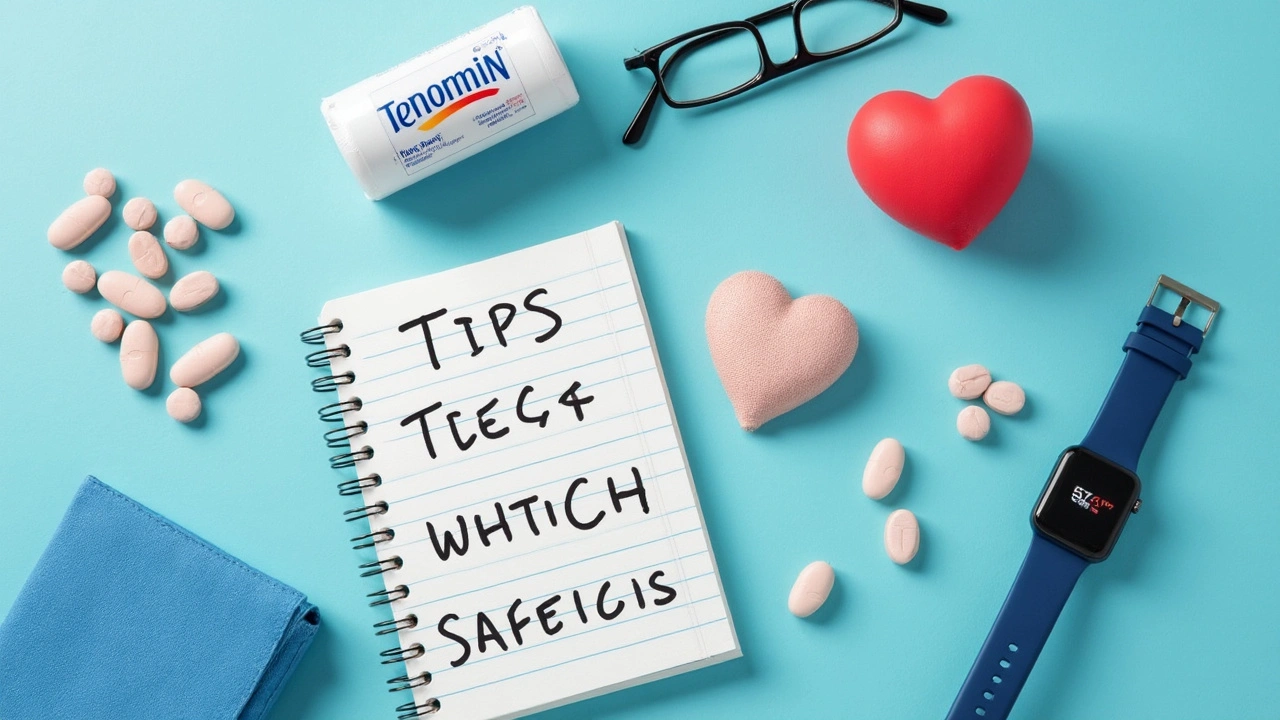Tenormin Uses, Side Effects, and Safety Tips for Blood Pressure Control

If you ever had to memorize a list of blood pressure drugs, Tenormin would probably be near the top. There’s no way around it: heart problems are a massive issue in the world, and Tenormin—also known by its generic name atenolol—has played a starring role in keeping blood pressure in check for decades. But what makes this little pill so special, and why do some folks swear by it while others steer clear? If you’re curious about the details and want tips for using it wisely, stick around—it’s not just for heart attack survivors or old guys watching their salt intake anymore.
How Tenormin Works in Your Body
This isn’t just another tablet you wash down with your morning coffee. Tenormin belongs to a class called beta blockers. These drugs, discovered in the 1960s, changed how doctors deal with high blood pressure, chest pain, and heart rhythm issues. Here’s the deal: your body has adrenaline racing around, revving up your heart, especially when you’re anxious, exercising, or upset. Tenormin blocks those beta receptors, so your heart doesn’t beat as hard or as fast. That helps the heart use less oxygen, keeping things cool even under pressure.
Doctors didn’t always have this in their toolkit. Before beta blockers, the main drugs for high blood pressure were diuretics (basically, water pills), and if you had a heart problem, your options were limited. Studies from the 1970s showed atenolol could not only drop your numbers on the blood pressure cuff but also lower the risk of getting another heart attack if you’d had one. That’s why it’s still stocked on pharmacy shelves in just about every country that has a pharmacy.
But how exactly does it work its magic? Well, think of beta receptors as little doors on your heart and blood vessels. When they’re blocked, your heart stays calm, doesn’t pound with every stress, and your blood moves through more open, relaxed pipes. That means you’re less likely to blow a physical or emotional gasket—and your doctor can breathe a little easier about your stats.
One more detail: some heart medications are a little sloppy and mess with your lungs or other organs, but Tenormin has a reputation for being "cardioselective," meaning it mostly minds its business in the heart. Still, don’t think it’s totally hands-off—it’s got a list of side effects, and it’s not for everyone, so understanding its action can help you spot issues early if they happen.
Who Should and Shouldn’t Use Tenormin?
Here’s where things get real. Tenormin isn’t a one-size-fits-all fix. Doctors usually hand it out for high blood pressure (hypertension), irregular heartbeats (arrhythmias), angina (that squeezing chest pain you don’t want to ignore), and sometimes after a heart attack to keep your ticker safe. There’s even a smaller group who get it for things like migraine prevention and frantic physical symptoms of anxiety. But before you start, your medical history matters.
If you have asthma or any form of chronic lung disease, Tenormin could be trouble. It can make breathing worse in folks with sensitive lungs—even though it’s supposed to be heart-specific, it isn’t perfect. Diabetics should also look twice, since beta blockers can mask the symptoms of low blood sugar, like a racing pulse. If your kidneys don’t tick along like they should, you might need a lower dose, since atenolol is cleared from the body by the kidneys.
Got slow heartbeats (bradycardia), certain heart blockages, or very low blood pressure? Back away from the Tenormin. Starting or stopping it suddenly can cause problems, especially if you’ve been on it for months or years. If you suddenly stop, your heart may rebound and beat even harder—which is a recipe for disaster if your arteries are already clogged.
Your doctor should review your meds for interactions. Mix Tenormin with other drugs that slow the heart, like diltiazem or some anti-arrhythmics, and you could end up dizzy or fainting on the kitchen floor. Even some over-the-counter cold meds can mess with your blood pressure if you’re taking beta blockers.
Quick tip: always keep your medication list up to date, especially if you travel or end up in the emergency room. Knowing you’re on a strong beta blocker like Tenormin can make a huge difference in an emergency.

Side Effects and What to Watch For
No drug is perfect, and Tenormin has its share of downsides. Common things people report include feeling tired, cold hands or feet, a slower-than-usual heart rate, or even strange dreams at night. Some folks mention gaining a little weight when they start beta blockers. For the unlucky few, the fatigue can be tough—they feel like they’re walking through molasses. Sound familiar? Bring it up with your doctor; tweaking the dose or switching meds might do the trick.
Sexual side effects aren’t unheard of either. Men sometimes report less interest or problems in the bedroom. The link isn’t always clear-cut, but if your love life takes a hit after starting Tenormin, you’re not imagining things. Tell your doctor; there are workarounds.
There are rare but serious side effects you don’t want to ignore. If you get very short of breath (not just when exercising, but even at rest), dizzy spells that don’t go away, or notice your heartbeat is painfully slow, that’s your clue to call for help. Allergic reactions are less common but can include rash, swelling, or trouble breathing.
Let’s talk about withdrawal. Never, ever just stop Tenormin or any beta blocker without a doctor’s say-so. Stopping suddenly can make your blood pressure or chest pain come roaring back, sometimes even worse than before. Docs usually ease you off slowly—sometimes over weeks.
If you miss a dose, don’t double up. Just take your next dose at the regular time and mention it at your next visit, especially if you keep forgetting. Some people use pill organizers or set alarms to stay on track. If you’re new to this medication world, those little tricks can really help.
Tips for Taking Tenormin Safely and Effectively
This isn’t like taking a vitamin—you want to get the most benefit with the fewest problems. The first rule: take Tenormin at the same time every day. Most people take it in the morning, but if it makes you tired, ask your doctor about switching to nighttime. Consistency keeps your blood pressure steady and reduces ups and downs.
Food doesn’t majorly affect how Tenormin works, so it’s fine with or without meals. But washing it down with a big glass of water can help it go down smooth and make sure it hits your stomach, not stuck in your throat (trust me, that’s uncomfortable).
If you like to measure your blood pressure, keep a log at home. Bring it to your appointments. Doctors pay attention to patterns, not just a one-off number in the clinic. If Tenormin suddenly stops working as well, or if you get side effects you can’t shake, your log will help your doctor decide what to do next.
Watch your lifestyle habits, because the pill isn’t magic. Eating less salt, getting regular (even gentle) exercise, and quitting smoking all help Tenormin do its job. If you drink lots of alcohol or binge caffeine, talk to your doc—both can affect how this med works or how you feel on it.
Stick to your refill schedule. Tenormin works best when you take it regularly—if you skip doses, your blood pressure can bounce up and down, which is the last thing you want. Some pharmacies offer auto-refills or reminders. Take advantage. If you ever run into trouble paying for prescriptions, let your doctor or pharmacist know. There are programs and generics that can lower the cost a lot.
For parents: sometimes Tenormin is given to kids for certain heart or migraine issues, but always follow a pediatrician’s advice. Dosing must be exact, and side effects can look different in kids.

Extra Insights: Studies, Myths, and Everyday Examples
The story of Tenormin isn’t standing still. Back in the 1980s and 1990s, doctors prescribed beta blockers like candy for their cholesterol-lowering and heart-protective effects. Then, large clinical trials came out suggesting newer drugs—like ACE inhibitors and calcium channel blockers—work just as well, sometimes with fewer side effects. Still, for certain people (especially those recovering from heart attacks), Tenormin remains a go-to.
Did you know that atenolol, the generic for Tenormin, is on the World Health Organization’s List of Essential Medicines? That means it’s considered one of the safest and most effective meds needed in a health system. Not every pill gets that honor. It’s dirt cheap, too—meaning it’s available almost everywhere and accessible even if you’re on a tight budget.
Some myths never die. A common belief is that once you start a beta blocker, you’re on it for life. Not true. Treatment should be reviewed regularly, especially if your risk factors change, you lose a lot of weight, or your blood pressure stays low for a while. Doctors might dial back your dose or even stop it if needed. But again—slow and steady wins the race here. No cold-turkey stops.
People often ask if taking Tenormin means they’ll never be able to exercise again. That’s a myth, too. Yes, you might notice your pulse doesn’t get as high during a workout and you may not feel the same "burn" when pushing hard. But moving your body is highly recommended, and most people can stay active. Tip: Start slow, warm up, and give your heart a little extra time to adjust.
Stories from real life show the range. I know a woman who swears her stage fright melted away after she started Tenormin (she takes it before big presentations—yep, that’s a trick some musicians and public speakers use with their doc’s okay). On the flip side, a guy who races marathons found he couldn’t reach his top speed, so he and his doctor switched to a different blood pressure pill that let him compete without sacrificing control of his numbers.
Another useful fact: atenolol does not pass into the brain as easily as some other beta blockers, so you may be less likely to get those weird vivid dreams or depression that sometimes show up with this drug class. If you ever deal with mood issues on blood pressure meds, report it—sometimes just switching brands makes a difference.
Always double-check the pill in your bottle. Generics are often swapped at the pharmacy, and while the active ingredient is the same, the tablets can look different. If you’re ever unsure, ask the pharmacist to confirm you’ve got the right med before leaving.
You don’t need a PhD to manage your health, but knowing a thing or two about your meds—the good stuff, the risks, and the street-smart tips—puts you in the driver’s seat. Next time you’re at the doctor’s office and Tenormin comes up, you’ll know exactly what to ask.

Shubham Semwal
June 30, 2025 AT 20:53Look, if you're still on Tenormin in 2024, you're either living in 1998 or your doctor doesn't read journals. ACE inhibitors and ARBs are way better now-less fatigue, no masked hypoglycemia, and they don't turn you into a zombie who can't run up the stairs. Atenolol is basically the flip phone of beta blockers.
Sam HardcastleJIV
July 2, 2025 AT 18:25One is compelled to observe, with a certain degree of scholarly detachment, that the pharmacological paradigm underpinning beta-blockade-particularly with atenolol-has undergone considerable revision in the context of contemporary cardiovascular epidemiology. The utility of this agent, once unquestioned, now appears contingent upon a constellation of patient-specific variables, none of which are adequately addressed in the present exposition.
Mira Adam
July 3, 2025 AT 09:03Oh please. You people act like this drug is some miracle cure. It’s a band-aid on a bullet wound. You take Tenormin because you’re too lazy to change your diet, stop drinking, or actually move your body. And then you wonder why you’re tired all the time. It’s not the pill-it’s your life.
Miriam Lohrum
July 5, 2025 AT 01:41There’s something poetic about a drug that slows the heart to help it live longer. We’re all running too fast-tennis matches, deadlines, notifications-and here’s a pill that forces you to pause. Maybe it’s not just treating blood pressure. Maybe it’s treating modernity.
archana das
July 5, 2025 AT 23:16In India, we call this medicine 'heart quietener'. My uncle took it for 15 years after his heart attack. He didn’t know what beta blockers were, but he knew it helped him sleep, walk to the temple, and not feel like his chest was being squeezed by a python. Cheap, simple, works. Why fix what isn’t broken?
Emma Dovener
July 6, 2025 AT 15:27For anyone on Tenormin: track your resting heart rate daily. If it drops below 50 and you feel lightheaded, talk to your doctor. Also, cold hands? That’s the drug. Not your heater. And yes, it can make you gain weight-water retention, not fat. Don’t panic. Just monitor.
Sue Haskett
July 6, 2025 AT 23:35Don’t. Ever. Stop. Tenormin. Abruptly. Seriously. I mean it. I’ve seen people collapse. I’ve seen ERs filled with people who thought they could 'taper off' by skipping a few days. No. No. No. Your heart remembers. It doesn’t forgive. Please. Just. Don’t.
Jauregui Goudy
July 7, 2025 AT 09:41Guys. I was on this for 3 years. Lost 40 pounds. Started running. My doc said I could stop. I did. Two weeks later, I had chest pain at 3 a.m. and called 911. Don’t be a hero. This isn’t a vitamin. It’s armor. And armor doesn’t just vanish because you feel 'better'. You’re not better-you’re just not crashing yet.
Tom Shepherd
July 7, 2025 AT 14:22i took tenormin for like 6 months and i swear it made me super drowsy like i was always 3 hours behind. also my hands were always cold. like ice. i thought it was winter but nope. just the pill. switched to lisinopril and boom. normal human again.
Rhiana Grob
July 9, 2025 AT 05:43It’s interesting how we treat medication like a moral choice-either you’re disciplined for taking it, or lazy for needing it. But blood pressure isn’t a character flaw. It’s biology. Tenormin helped me live. That’s all. No judgment needed.
Frances Melendez
July 10, 2025 AT 16:11Of course you're on Tenormin. You didn't fix your stress, you didn't quit junk food, you didn't stop drinking wine at 10 p.m. You just swallowed a chemical crutch. And now you're proud of yourself for 'managing' it? That's not managing. That's avoiding. Pathetic.
Jonah Thunderbolt
July 12, 2025 AT 06:51Atenolol? 😒 The original 'I’m too tired to care' pill. I mean, it’s like your heart went on a spa retreat and forgot to come back. Also, it’s on the WHO’s essential list? That’s like saying dial-up is essential because it still connects to the internet. We’ve had fiber for decades. Just saying. 🤷♂️
Rebecca Price
July 12, 2025 AT 15:14Let’s be real: Tenormin is the quiet, reliable friend who shows up every day, never complains, and doesn’t make a scene-even when you’re a mess. It doesn’t dazzle. It doesn’t trend. But it keeps you alive. And sometimes? That’s enough.
shawn monroe
July 14, 2025 AT 10:52Cardioselective beta-blocker with renal excretion-key point. That means if you’ve got CKD, you need dose adjustments. Also, it has zero active metabolites, so no accumulation. That’s why it’s preferred in elderly vs. propranolol. But yeah, side effect profile is brutal. Fatigue, sexual dysfunction, bradycardia-classic triad. You want efficacy? You pay the price.
marie HUREL
July 15, 2025 AT 21:02I started Tenormin after my anxiety got bad. I didn’t tell anyone. I thought I was just tired. But then I realized-I wasn’t tired. I was numb. I stopped it slowly, with my doctor’s help. Now I do yoga and breathe. I still take it sometimes, only when I’m overwhelmed. It’s not a life sentence. It’s a tool.
Lauren Zableckis
July 16, 2025 AT 04:30My mom took this for 20 years. She never complained. She just took it. One day she said, 'I don’t feel like I need it anymore.' We went to the doctor. They lowered her dose. Then stopped it. She’s 72. Blood pressure’s perfect. Sometimes the body learns to heal itself.
Asha Jijen
July 17, 2025 AT 12:01atenolol is like that uncle who shows up to every family event with the same story and no one knows how to tell him to shut up. it works but its so old and boring and you just want something new
Edward Batchelder
July 18, 2025 AT 12:31To everyone on Tenormin: You’re not weak. You’re not failing. You’re doing the hard thing-showing up, taking care of yourself, even when it’s boring, even when it’s inconvenient. That’s courage. Keep going. You’ve got this.